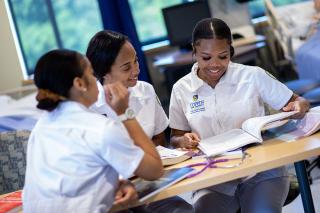Helene Fuld School of Nursing
Current Nursing Students
Student Resources
Take advantage of the wide variety of services offered to our Nursing Students.
Living Learning Communities
CSU College of Health Professions Living Learning Communities (LLC) is designed to help students during their two years as they transition to the University. Students are able to integrate curricular and residential life in a collaborative environment with other nursing and allied health students. The LLC allows for education to be changed from "learning in a silo". Students will learn that their faculty members are working collaboratively with these students. The goals of the HFSON Living Learning include:
- Fostering lifelong learning
- Facilitating the student's transition to the University
- Promoting student persistence
Nursing and Allied Health Honors Program
The Nursing and Allied Health Honors Program is an adjunct of the University Honors Program. To be eligible for any Departmental Honors Program, students must meet one of three criteria:
- They must have accrued at least sixty credits and must have earned a minimum cumulative grade point average of 3.0
- They must have successfully completed the General Studies Honors Program
- They must have accrued at least sixty credits and must have demonstrated outstanding ability in their fields of study
Upon completion of the first two years of matriculation in the General Studies Honors Program and with the Dean's approval, nursing and allied health students may earn departmental honors through participation in the Honors program.
Learning Resource Center
The Resource Center (RC) is a clinical preparatory facility with standard healthcare equipment. Students practice actual one-on-one patient care simulations before entering a health care facility. The Computer Lab is equipped with computer hardware and software. Students may use software on an independent basis or with an instructor or staff person to enhance their nursing knowledge.
Mentoring and Coaching
A model of instruction (rooted in cognitive coaching theory) where the educator/practitioner is a guide and collaborator in the student's learning and is not the sole director.
Mentoring and Coaching Student Responsibilities:
- Attend weekly sessions
- Complete all standardized achievement tests
- Develop an individual plan for academic and testing success
- Download the current NCLEX-RN Test Plan or RHIA test plan. The NCLEX-RN is a standardized exam used to establish a nursing candidate's preparedness for entry-level work
- Develop an individualized remediation plan
- Identify your test-taking style
- Review test-taking strategies
- Simulate testing utilizing review book questions
- Use your textbook as a valuable resource
- Work collaborative with the faculty member.
Simulation
Simulation is an integral part of the clinical experience in which realistic situations are utilized for the learner to gain knowledge and skills. Simulation is grounded in experiential learning theory; holistic learner-centered learning created through transformation of experiences (Kolb, 1984). Simulation is identified as focused clinical strategies using low, medium or high-fidelity simulation. Low-range experiences include: focused case studies, role playing, virtual clinical excursions and/or task-trainers. Medium range experiences include increased realism, screen-based simulators, synthetic models, moulage and live actors. High range fidelity experiences may include the use of simulators. Medical Education Technologies Incorporated (METI) and/or Laerdal simulators including the SimMan, SimBaby and additional technologies may be used.
College of Health Professions – Academic Success Center
The College of Health Professions – Academic Success Center is strategically located within the College of Health Professions. The College of Health Professions – Academic Success Center serves students in the General Health Professions, Helene Fuld School of Nursing and the School of Allied Health. The main reason for this organizational structure is to systematically assess and evaluate admission and retention issues while developing new approaches. In collaboration with the various administration leaders, faculty, staff and students, The College of Health Professions – Academic Success Center is committed to using “Best Practices” to advise, recruit and retain regional, national and international candidates for our Accelerated Second Degree BSN, Traditional BS in Nursing, RN to BSN, BS in Health Information Management (HIM) both at the Baltimore campus and University System of Maryland – Hagerstown (USMH) campus, MSN for Family Nurse Practitioner (FNP), Post-MSN in FNP, and Doctor of Nursing Practice programs that are offered through the College of Health Professions.

HFSON Baccalaureate Nursing Student Handbook
Grading
A student must attain a final grade of "C" in all nursing courses required in the Nursing Program of Study. Student performance in the clinical practice components will be graded on a pass/fail basis; the criteria for determining acceptable performance are included in the syllabus of each clinical nursing course. Satisfactory clinical performance is required to earn a passing grade in a clinical nursing course. A student who is not performing at a satisfactory level will be so advised at mid-point in the course. A student must pass both clinical and didactic components to pass the course. A student enrolled in the RN to BSN must submit a Portfolio as a part of the Graduation clearance.
The grading scale for all nursing courses:
A = 90 - 100
B = 80 - 89
C = 75 - 79
D = 69 - 74
F = 68 or below
Clinical Courses: PASS/FAIL
Requirements for Graduation
A Senior nursing student must have a cumulative GPA of 2.5 or greater, and satisfactory completion of all courses in the nursing program of study (perquisites and major); and pass a standardized comprehensive assessment examination which predicts the students probability of passing the National Council Licensure Examination (NCLEX) at the benchmark established by faculty in order to exit the nursing program.